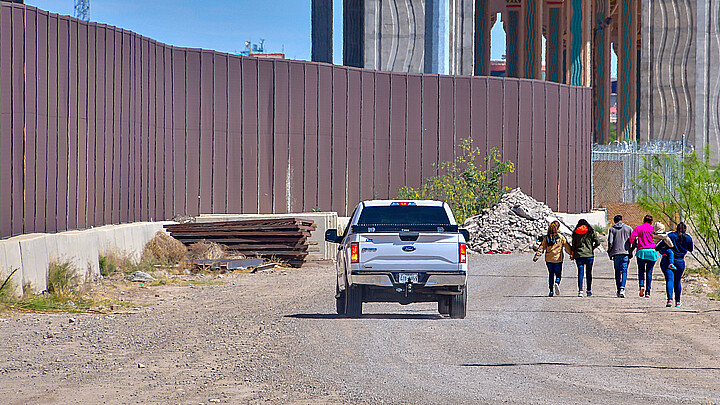Immigration
Christmas Eve Heartbreak: Migrants were abandoned at San Diego bus stations by U.S. officials, say local reports
Many of the migrant shelters were reportedly filled to capacity on Christmas Eve, leaving U.S. officials at a loss of what to do with incoming migrants purportedly seeking asylum
January 3, 2023 12:14pm
Updated: January 3, 2023 12:23pm
U.S. Border patrol agents reportedly abandoned hundreds of migrants at different bus stations throughout San Diego County, leaving them defenseless to winter storms. The incident was first reported by San Diego’s NBC 7 affiliate just before Christmas, and subsequently followed by the San Diego Union Tribune and Los Angeles Times.
Many of the migrant shelters were reportedly filled to capacity, leaving U.S. officials at a loss of what to do with incoming migrants purportedly seeking asylum.
“As many as 250 migrants” were left behind by CBP officials at various bus and other transit stations around the county on Dec. 23, the night before Christmas Eve, according to NBC 7 news.
“The migrants were brought to the El Cajon Transit Station; the Rancho Del Oro Transit Station, in Oceanside; and the Iris Avenue Transit Center, in the city of San Diego, officials told NBC 7. At this point, it's unclear where the migrants were being held prior to their release,” the local affiliate reported.
Those reports were corroborated by the San Diego Union Tribune and subsequently by the Los Angeles times.
“From El Cajon to Oceanside, migrants found themselves suddenly on the streets, some without phones, and in some cases without the family members they’d traveled with. Those who spoke with the Union-Tribune had crossed into California at various parts of the Mexico-U.S. border. It was not clear whether any had been bused to San Diego for processing by the U.S. Border Patrol after crossing farther east in
Yuma, Ariz., which has become a hot spot for apprehensions,” the San Diego Union Tribune reported.
Reports indicate that those with family and friends in the San Diego area waited to be picked up while others used what money they had to call Ubers and taxis to take shelter in the airport or find an outgoing flight to reach their relatives in other U.S. locations.
“Due to the extreme weather conditions impacting outbound travel, our resources and the current infrastructure have been stretched to capacity,” the San Diego Rapid Response Network Migrant Shelter wrote in a statement to the Tribune.
“At this time, we cannot respond to requests coming through the… emergency hotline to assist in sheltering additional asylum seekers. We will resume welcoming additional asylum seekers as capacity and weather conditions improve, while also calling on the federal government to prioritize rebuilding our country’s broken asylum and immigration systems, including improved processes for migrant shelter services across the border region,” the shelter reportedly said.
U.S. officials also said the federal agency was working with local San Diego and California state officials to release some migrants from custody in “a safe manner” adding that “all noncitizens released from custody are provided essential support upon release and may access transportation to continue to their destinations.”
Migrants who cross the border from Tijuana into San Diego County, and are subsequently captured and released usually go to one of two area shelters operated by Catholic Charities and the San Diego Rapid Response Network. Both are funded by both state and federal monies.
“Family separations have become common under a Border Patrol strategy of shifting arriving migrants from one area to another for processing. The American Civil Liberties Union of San Diego and Imperial Counties and Jewish Family Service wrote a letter in July 2021 calling for an end to such separations, the Tribune reported.
To date, the Golden State has reportedly spent about a billion dollars on supporting migrant housing, according to the California Governor’s Office of Emergency Services.
“These types of events are an important reminder that additional federal resources and meaningful reform are needed to support appropriate border infrastructure that reflects current needs,” spokesman Brian Ferguson told the Tribune.
The recent migrant bus station incidents created a stir among local officials who expressed frustration with decision making at the federal level.
San Diego Mayor Todd Gloria wrote a letter to U.S. officials asking for more assistance amid the potential end of Title 42, a Trump-era pandemic policy that kept most asylum seekers in Mexico while their asylum applications were pending.
San Diego County Supervisor Jim Desmond complained that the U.S. needed to make greater efforts to create shelter housing for migrants rather than abandoning them.
While some migrants and their children were waiting in bus stations, one report indicated that two San Diegans working at a nearby car dealership spotted CBP releasing about 60 people in a parking lot near bus stations, which are prone to criminal activity at night.
"The federal government is failing its obligation to protect the people of San Diego County, Desmond wrote in an official statement. “This system is broken and puts our region at risk. If the federal government wants to process asylum seekers, they must provide adequate resources to manage people entering our region. Our system is already overburdened, and this is before Title 42 is potentially lifted."










